 AI
AI
 AI
AI
 AI
AI
In an analyst briefing last week, Cisco Systems Inc.’s Webex shared updates from across its suite of offerings.
Today’s AnalystANGLE conversation features a conversation with Zeus Kerravala of ZK Research and a member of theCUBE Collective community as we come together to unpack the updates announced around Webex Contact Center, the benefits those updates deliver for customers, and the challenges we see ahead for Webex.
I’ve long felt the Webex Contact Center solution is impressive, packed with features that I’m guessing many people don’t know about. Technically, they’ve built a competitive, if not market-leading stack. But the real challenge is communicating that: How does it turn this differentiated, better experience into customer adoption?
In our conversation today, Zeus and I dive into some of the capabilities and features that Webex Contact Center offers, along with the AI integrations that are designed to uplevel the overall experience for both customers and agents.
Many of the announcements and updates made by the Webex team during last week’s analyst meeting were announced/previewed for the analyst community in late October at WebexOne, so there were few surprises. Updates include:
Speaking of RMM, why is that relevant, especially as it relates to Webex Contact Center? Webex’s RMM sits alongside Webex’s large language model and uses generative AI for audio and video to add texture and context to the text that’s there. Webex’s RMM functionality features noise removal, speech and video enhancement and gesture recognition, all of which help to provide contact center agents with the ability to deliver enhanced customer experiences with proactive, personalized communications.
Just what customers want, right? These knowledge and productivity tools help agents be more effective at delivering the right solutions at the right time, and Webex’s real-time optimization leads to enhanced efficiencies.
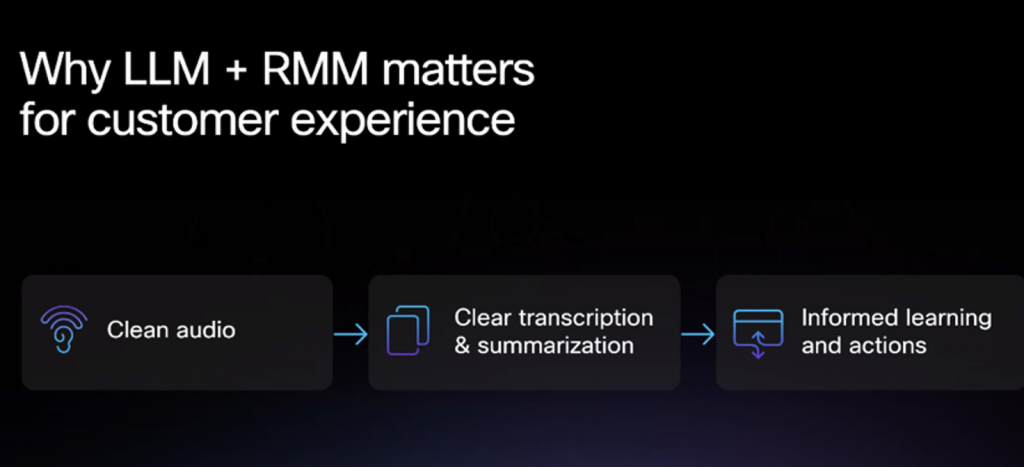
Every business faces the same challenges when it comes to delivering on customer experience: Maximize satisfaction, minimize costs. Webex’s AI-powered Contact Center approach is to make the interactions between the agent and virtual agent and the customer feel as good as possible. Better business outcomes, better customer experiences, and better agent experiences are the end goal here.
Built from the ground up, Webex Contact Center is a cloud-based contact center solution that can be used across multiple channels, supercharged by Webex’s AI Assistant. Features include:
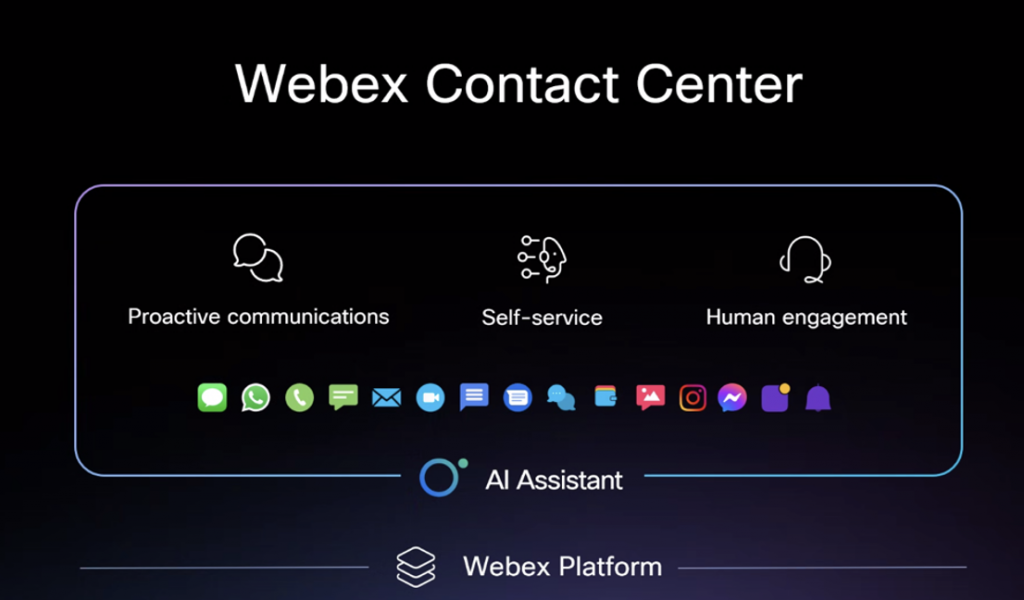
From a customer-centric standpoint, Webex’s objective is clear: Never make a customer wait, never make her repeat herself, and make it feel like a customer has a personal concierge every time. It’s clear that the way Webex views best-in-class experiences is that voice is the predominant channel. Built on that premise, add voice plus real-time interaction for problems that can’t be automated (yet) and give people the best possible audio experiences.
Note that all of these features are available now.
Taking a look at what’s ahead for Webex Contact Center, there’s a lot of focus on agent well-being. I remember seeing demos of this functionality at WebexOne last fall and was impressed by this. Supervisor effectiveness is great, but mental health issues and burnout are very real threats.
Let’s face it: There aren’t many front-line jobs more stressful than that of a contact center agent, and supporting them in ways that can help make their jobs easier, more enjoyable and more satisfying leads to better customer interactions, less employee churn and better outcomes overall.
Webex AI includes agent burnout detection, which can sense when an agent struggles or is challenged. The platform also features automatic conversation summaries, recommended next actions, proprietary agent answers and suggested responses and, for supervisors, coaching highlights that can help them better mentor and assist their contact agent teams.
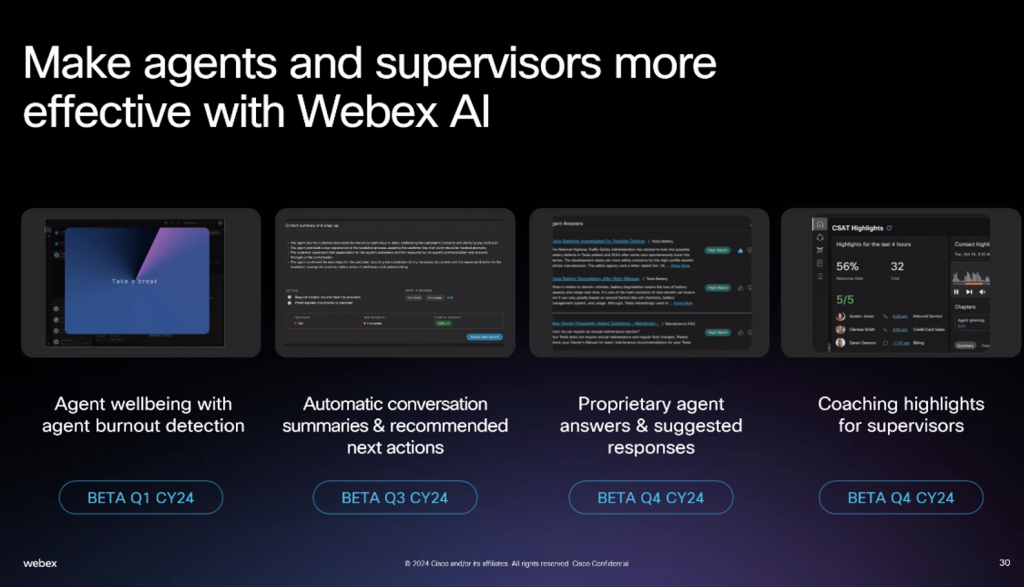
In addition to the foregoing, Webex has addressed the reality that more than 80% of those post-engagement surveys that you get when you utilize a contact center go unanswered by building in automatic customer satisfaction scores. The AI-powered functionality here can automatically fill in the data gap by assessing the agent engagements, business gets a more complete picture and can drive reskilling decisions or staffing decisions using this. Zeus and I talked about this in our conversation and explored how this sounds like a great feature, but there could be some downsides as well.
The platform also offers customer sentiment insights that signal when a caller should be routed to a different agent or provide assistance to an agent to let them know they’re dealing with an upset customer. It will allow agents to “know” a customer by looking at sentiment over time and adapting their approach to help get to a speedier resolution.
These insights are across the channels, but the Webex team believes there is a richness in video or audio that allows contact center agents to learn more and get a more precise valuation of sentiment, making the work they are doing more accurate.
In the final part of our discussion, Zeus and I touched on some of the broader Webex announcements beyond the company’s investment in audio and video intelligence and their investments in LLMs and RMM.
Immersive experiences are the holy grail industry-wide. Webex has doubled down on delivering immersive experiences with AI by way of language intelligence, audio intelligence and video intelligence built into the platform.
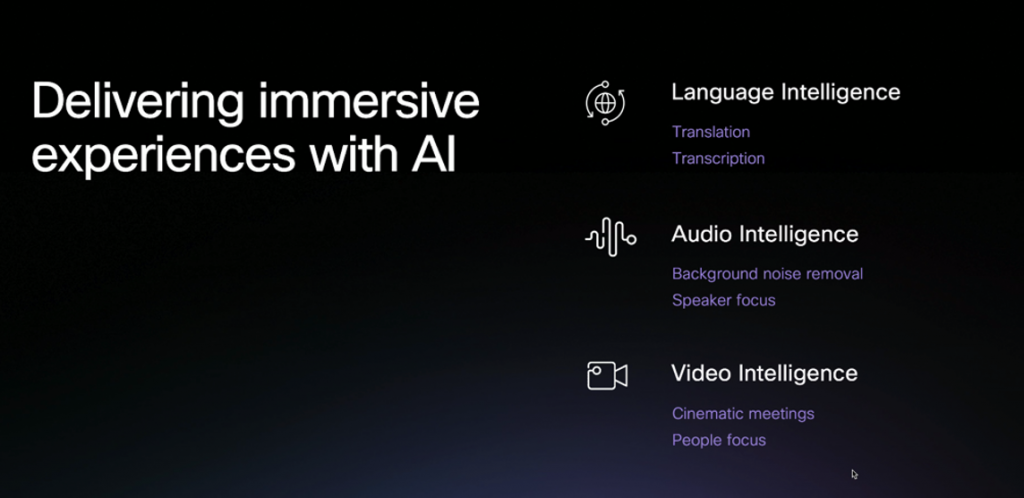
Webex’s Audio Intelligence AI Codec is something the Webex team is very proud of. It is embedded in the Webex platform and is designed to reduce bandwidth without a reduction in meeting quality. The Webex team demoed this for us on several occasions and it seems to significantly reduce bandwidth — it’s not hard to see the appeal there.
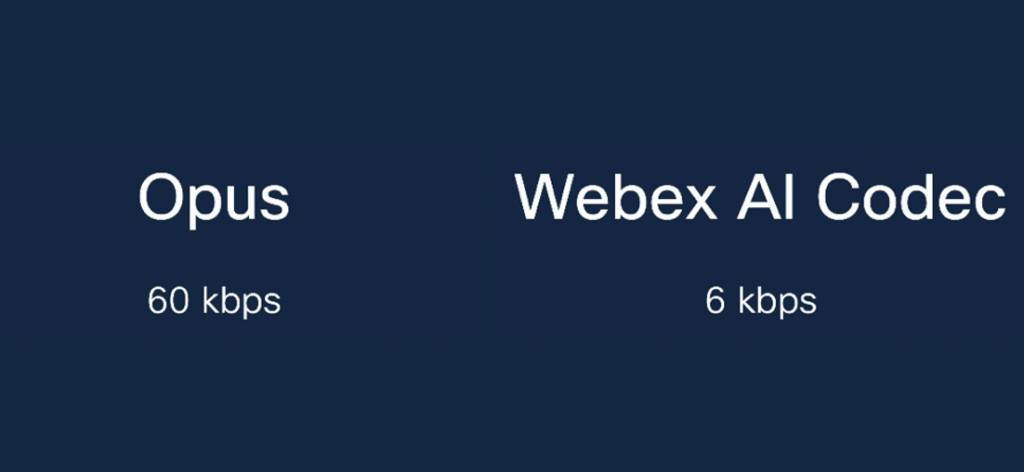
In addition, Webex has embedded intelligence into video devices, and multi-camera experiences, including the integration of cinematic meeting features into the Webex video portfolio for large conference rooms with multiple cameras.
With the Webex AI Assistant, users will see all of the AI tooling pulled together in a coherent, easy to use way. Webex AI Assistant will provide an LLM-driven set of functions like helping craft messages, suggesting changing the tone of a message, and providing meeting and message summaries in Webex, while working with RMM to provide additional functionality.
For instance, the AI Assistant can also be used to detect when you step away by leaving a placeholder, and then helping fill in what you missed when you were gone with summaries, action items or a replay of the highlights of the meeting if you missed the entire thing.
Webex is working with a group of customers testing AI Assistant for Webex, and though we are under NDA as to the participants, the beta group is comprised of some very well-known brands across a variety of industries. It will be interesting to hear their feedback once they come out of the beta program; customer use case examples are always what we like to see and hear.
Bottom line: As Zeus and I discussed in our AnalystANGLE discussion, Cisco and the Webex team are doing a lot of things right and their products and updates show their commitment to serving up world-class experiences, whether by way of Webex Contact Center powered by Webex AI, a collaboration suite featuring language, audio and video intelligence powered by the Webex AI Assistant, or meeting room devices that level the playing field for both on-premises and remote workers when it comes to communicating and collaborating, it’s all good.
The challenge we see, especially regarding Webex Contact Center, is that this is a great solution and one that we feel the market largely doesn’t know enough about. The pricing is competitive, and Webex is committed to supporting its partner ecosystem, seeding devices, and spurring use and adoption.
Although I haven’t personally used the Webex Contact Center solution, I can attest that I’ve been a Webex collaboration platform user since the product was first rolled out. I’ve also used all the competitor platforms on the market and keep coming back to Webex because it truly does offer an optimal experience across multiple use cases. Now, Webex needs to work across partner ecosystems and directly with customers to educate the market on just how robust the Webex suite of offerings is and inspire trial. Once you’re using the platform, it’s easy to see why people like it.
In this AnalystANGLE series, you can expect interesting, insightful and timely discussions, including news, thoughts on strategies, and coverage of major vendors and solutions. You can always count on transparency, honest opinions and insights and real talk. You can find us on the interwebs here:
Disclosure: theCUBE Research is a research and advisory services firm that engages or has engaged in research, analysis, and advisory services with many technology companies, which can include those mentioned in this article. The author holds no equity positions with any company mentioned in this article.
Analysis and opinions expressed herein are specific to the analyst individually, and data and other information that might have been provided for validation, not those of theCUBE Research or SiliconANGLE Media as a whole.
Support our mission to keep content open and free by engaging with theCUBE community. Join theCUBE’s Alumni Trust Network, where technology leaders connect, share intelligence and create opportunities.
Founded by tech visionaries John Furrier and Dave Vellante, SiliconANGLE Media has built a dynamic ecosystem of industry-leading digital media brands that reach 15+ million elite tech professionals. Our new proprietary theCUBE AI Video Cloud is breaking ground in audience interaction, leveraging theCUBEai.com neural network to help technology companies make data-driven decisions and stay at the forefront of industry conversations.